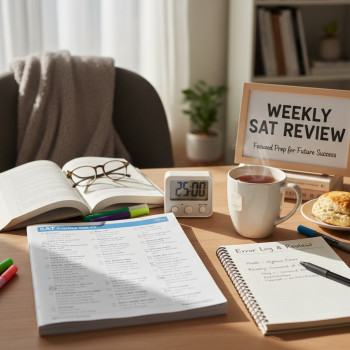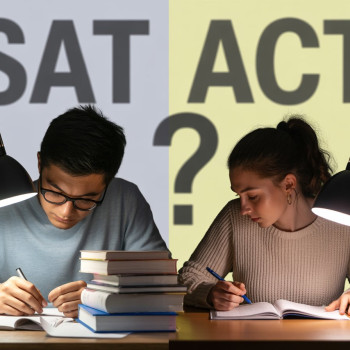Introduction: The Surprisingly Natural Fit Between Debate and SAT Reading
Imagine you’re in a debate round: an opponent has made a claim, you’re scanning for weaknesses, assembling counterpoints, and deciding whether the evidence supports a strong rebuttal. Now picture the Digital SAT Reading section—passages, claims, evidence, inference, and time pressure. If that felt familiar, you’re not alone. Students who participate in debate often enter the SAT reading room with a head start. The habits they’ve formed—analytical listening, precise use of language, rapid evaluation of evidence—map almost perfectly onto what the SAT asks you to do.
This blog explores exactly why debate-trained students tend to excel on the Digital SAT Reading section, breaks down the specific skills involved, gives practical exercises and study routines, and shows how you can translate debate practice into measurable score gains. We’ll also look at sample approaches, a study timetable you can adapt, and a simple table comparing debate habits to SAT tasks so you can use your strengths intentionally.
What the Digital SAT Reading Section Really Tests
Before we connect debate skills to SAT performance, let’s clarify what the Digital SAT Reading section measures. It’s not about remembering trivia or loving literature—it’s about:
- Identifying the main idea and author’s purpose
- Following argument structure and reasoning
- Evaluating evidence and how it supports claims
- Making inferences and drawing logical conclusions
- Understanding tone, implication, and nuance
These are all intellectual habits of mind—skills that can be practiced and strengthened. Debaters already practice many of them, often under pressure, making them comfortable with the cognitive demands of the SAT.
Core Debate Skills That Translate Directly to SAT Success
1. Rapid Claim Identification
In debate you learn to spot the core claim in a speech within seconds. The SAT does the same thing with written passages: you must quickly recognize the author’s thesis or the primary point of a paragraph. This skill saves time and prevents misreading complex sentences as the test’s clock ticks.
2. Evidence Tracking and Source Evaluation
Debaters constantly ask: What supports this claim? Is the evidence anecdotal or empirical? How strong is the link between the evidence and the conclusion? The SAT loves evidence-based questions—often asking which sentence best supports a claim or how a detail affects author intent. Practicing evidence tracking in debate (flagging statements, tagging supporting lines) is directly applicable to marking passages efficiently on the Digital SAT interface.
3. Recognizing Logical Structure
Is the argument causal, comparative, illustrative, or illustrative-by-example? Debaters diagram arguments to reveal structure; SAT readers who do the same can more easily answer questions about function, organization, and progression of ideas.
4. Inferencing Under Pressure
Debate fosters rapid inference—moving from explicit claims to plausible implications. The SAT frequently tests subtle inference, asking you to choose answers that are logically implied, not stated. Debaters’ comfort with reading between the lines makes these questions feel less mysterious.
5. Precision with Language
Debate trains you to parse modifiers, qualifiers, and carefully chosen words (e.g., “might” vs. “must”). The SAT rewards this attention to nuance in tone and in the connotation of terms—skills debaters wield every round.
6. Portability of Time-Management Strategies
Tournaments teach you to allocate minutes across speeches and cross-examinations. Translating that pacing to a timed reading section—knowing when to skim, when to read carefully, when to flag and return—improves both speed and accuracy.
Concrete Examples: Debate Moves vs. SAT Question Types
Let’s connect specific debate techniques to SAT question types with short examples you can practice.
Example A: Main Idea Questions
Debate move: Summarize an opponent’s argument in one sentence for a judge. SAT application: When the prompt asks the main idea of a passage or paragraph, your debate-summary habit helps you craft a compact, accurate answer. Practice by turning paragraphs into 10–12 word thesis statements.
Example B: Evidence-Support Questions
Debate move: Point to which evidence best supports a claim and explain why weaker evidence fails. SAT application: When asked which sentence supports a claim, mentally map each answer choice to the claim and eliminate any that are tangential or only indirectly related.
Example C: Function and Organization Questions
Debate move: Label whether a speechpiece is an example, a concession, or a rebuttal. SAT application: Many SAT questions ask about the function of a paragraph or sentence. Practice labeling paragraphs in practice passages with simple tags: “claim,” “support,” “counterargument,” “background.”
Practice Drills Borrowed from Debate
Below are drills that feel like debate practice but are tailored to the SAT reading format. Do these regularly and watch the difference.
- One-sentence thesis drill: Read one passage paragraph and write its thesis in one sentence. Time: 60–90 seconds.
- Evidence flash: For a given claim in a paragraph, underline two lines that best support it and explain the link in 20 words.
- Structure map: Draw a three-box diagram for each passage: Claim → Support → Purpose. Use it to answer five related questions without rereading the whole passage.
- Inference speed rounds: Read a short paragraph and answer three inference questions in 4 minutes—no backtracking. This builds comfort with leap-making under time pressure.
How to Build a Targeted Study Plan (6-Week Example)
Below is a flexible six-week plan that leverages debate strengths and fills in gaps. Adapt the timing based on your schedule and current score goals.
| Week | Focus | Daily Practice (30–60 min) | Weekly Check |
|---|---|---|---|
| 1 | Main idea & structure | 1 passage: write 1-sentence thesis + tag paragraph roles; 20 min vocab review | Timed 25-minute passage; note time spent per question |
| 2 | Evidence & support | Evidence flash (3 passages); 15 min targeted reading of editorial/nonfiction | Score improvement log; 1 full practice section |
| 3 | Inference & implication | Inference speed rounds (4 rounds); 10 min review of wrong answers | Timed section; track inference question accuracy |
| 4 | Tone & nuance | Annotate author tone in 4 passages; practice precise wording choices | Mixed section; identify questions lost to language nuance |
| 5 | Synthesis & paired passages | Read paired passages; map contrasting arguments; 30 min practice | Timed paired-passage set; analyze pacing |
| 6 | Full timing & strategy | Full-length Reading sections, review with error log | Final timed practice; set target score |
Consistency is more important than intensity. Debate teams that meet weekly build cumulative skill; apply the same principle to reading practice. If you want a faster path, Sparkl’s personalized tutoring can help by creating a tailored plan that focuses on your weakest question types and uses 1-on-1 guidance to accelerate improvement.
Time Management Tips — Borrowed from Tournament Play
Time is where many students trip up. Here are practical timing habits used by debaters that work on the Digital SAT:
- Scan for the claim first: Spend 30–45 seconds at the start identifying the thesis and topic sentence.
- Flag, don’t fixate: If a question seems complex, flag it and move on—return after completing quicker items.
- Group similar questions: Tackle all evidence questions together so you reuse your mental mapping of the passage.
- Use micro-deadlines: Set mini-timers within the section (e.g., finish passage 1 in X minutes).
- Practice pacing under simulated conditions: Use the same device and interface the Digital SAT will use to avoid surprises.
Common Pitfalls and How Debaters Avoid Them
Even strong debaters make mistakes on the SAT if they don’t translate their skills properly. Here are traps and fixes.
Pitfall: Over-arguing Beyond the Passage
Debaters sometimes rely on external knowledge or broader theory. The SAT wants evidence strictly from the passage. Fix: Anchor every answer to a line or concept explicitly present in the text.
Pitfall: Mistaking Persuasive Rhetoric for Evidence
Debate teaches rhetorical power; the SAT may ask whether rhetoric is persuasive versus whether it provides factual support. Fix: Distinguish between rhetorical devices (tone, imagery) and factual support (data, cause-effect statements).
Pitfall: Speed Without Precision
Tournament speed can translate into skimming too much. On the SAT, a quick precise read beats a fast vague read. Fix: Use precision skimming—identify claims and supporting sentences before answering.
How to Use Debate Practice Sessions as SAT Study Blocks
Here’s a sample 90-minute study block that looks like a debate practice but is focused on SAT reading gains:
- 10 minutes: Warmup—read an editorial and summarize the thesis in two sentences.
- 25 minutes: Practice passage—complete under timed conditions, mark evidence lines.
- 15 minutes: Team-style feedback—explain your answer choices aloud (this mimics cross-examination).
- 20 minutes: Focus drill—do three inference-only questions from different passages.
- 20 minutes: Review—log errors, note recurring traps, and plan the next block’s focus.
If you’re preparing alone, record yourself doing the explanation aloud—speaking forces you to clarify reasoning the way a judge might require in debate rounds.
Measuring Progress: What to Track
Tracking is a debate coach’s secret sauce. Keep a short, simple log for each reading practice:
- Passage type (literary, historical, social science, paired)
- Question types missed (main idea, evidence, inference, vocabulary in context, function)
- Time spent per passage and per question
- Root cause of each error (misread, inference, misinterpretation, careless)
Review every week to spot patterns. If inference questions are a recurring weakness, prioritize inference speed rounds the following week. For students who want targeted feedback, Sparkl’s expert tutors can diagnose patterns quickly and offer specific practice tailored to those weak spots.
Real-World Context: How Debate Experience Builds Lifelong Reading Habits
Beyond the test, debate trains you to be an active reader—someone who interrogates sources, weighs evidence, and listens for hidden assumptions. These habits benefit academic work, civic life, and workplace communication. The SAT is a snapshot of those abilities: doing well signals a capacity to analyze complex texts, a quality colleges value.
A Short FAQ: Quick Answers for Busy Debaters
Does debate guarantee a high SAT score?
No guarantee—practice and strategy matter. But debate gives you transferable skills that significantly lower the learning curve for SAT reading.
Which debate events help the most?
Policy, Lincoln-Douglas, and Public Forum are particularly helpful because they emphasize quick reading, argument analysis, and evidence use. Even parliamentary formats that force rapid case-building help build inference speed.
Can I use debate practice the week before the test?
Yes—do lighter, high-quality practice. Review your notes on common traps, do a timed passage or two each day, and prioritize sleep and confidence over cramming.
Sample Mini-Exercises You Can Do Anywhere
- One-sentence thesis on your phone: Read a news paragraph and text yourself a one-sentence summary.
- Evidence hunt: Pick an opinion article and underline the strongest piece of evidence for the main claim in 3 minutes.
- Inference flashcards: Write an explicit statement on one side and one implied idea on the other; practice until you can justify the inference in two lines.
When to Seek Extra Help
If you’ve practiced consistently for several weeks and see little improvement on inference or evidence questions, it’s time to get targeted help. One-on-one tutoring speeds progress because a skilled tutor can identify exactly where your reasoning diverges from the test’s expectations and give tailored techniques to correct it. Sparkl offers personalized tutoring that pairs expert tutors with AI-driven insights to create focused plans, something many students find accelerates improvement without wasting study hours.
Final Checklist for Debate Students Preparing the Digital SAT
- Practice writing 1-sentence theses for paragraphs.
- Annotate passages with labels: Claim, Evidence, Function.
- Do regular inference speed rounds to simulate time pressure.
- Keep a weekly error log and adjust drills accordingly.
- Use debate-style peer review or record yourself explaining answers aloud.
- Consider personalized tutoring if progress stalls—focused feedback saves time.
Conclusion: Turn Debate Strengths into SAT Confidence
If you debate, you already possess many of the cognitive tools the Digital SAT Reading section prizes: a knack for spotting claims, a habit of testing evidence, and comfort with rapid inference. The path to a higher score isn’t mysterious—it’s about adapting those tools to the SAT’s format and pacing. With disciplined drills, a simple weekly plan, and periodic review of error patterns, you can convert tournament skills into test-day performance.
For many students, the fastest way to get there is thoughtful, individualized practice—exactly the kind of tailored help Sparkl’s personalized tutoring provides through 1-on-1 guidance, expert tutors, and targeted study plans informed by intelligent analytics. Use your debate experience as a foundation, then layer on SAT-specific strategy. The result is not just better scores, but clearer thinking—on the page, in the round, and beyond.
Good luck. Read actively, argue honestly, and let your debate instincts guide you to confident, evidence-based answers.
















No Comments
Leave a comment Cancel